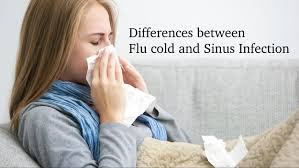How to Differentiate Common Flu and Sinusitis - Healthy T1ps
Watery eyes, sneezing, and nasal congestion can be signs that you have a common cold or even sinusitis. So how do you distinguish it?Signs and symptoms of a cold or cold
If you only have the common cold, you usually need to be friendly with a tissue for just a few days. In general, a cold will heal itself after ten days or even less.
Here are your signs of having a cold:
- Sore throat
- Coughs
- Headache
- Nasal congestion
- Sneezing
- Limp
- Runny nose
- Swelling in the nasal cavity
- Fever
The flu usually starts with a sore throat, which usually disappears after 1-2 days. Nasal sounds, runny nose, stuffy nose, and sneezing or coughing will usually disappear after 4-5 days. In adults, fever that accompanies flu is usually rare. Another story with children, usually children get a fever accompanied by a cold.
During a cold, your nose will runny filled with fluid that comes from the secretion of the nasal cavity for only a few days. After that, this liquid will thicken and the color will become darker. This thick snot occurs naturally. Keep in mind, snot that thickens does not always mean you have sinusitis.
Signs and symptoms of sinusitis
Well, if you have not recovered the cold for more than ten days, check with your doctor. It could be that you have sinusitis. Sinusitis is a disease in which your sinuses (holes that connect the nasal cavity and the skull) are infected. This infection is quite difficult to cure. There are various kinds of causes you get sinusitis, starting from viruses, bacteria, or even allergies.
Keep in mind that colds are usually not the cause of sinusitis. However, it can indeed be your habit when a cold can cause sinusitis. For example, when you have a cold, you may touch your nose very often, where it is possible for the bacteria in your hand to enter the sinus. Because your sinuses cannot filter these bacteria, the bacteria stay in your nose and multiply.
In general, here are your signs of sinusitis:
- There is pressure in the sinuses (behind the eyes and cheeks)
- A runny nose that occurs more than a week
- Headaches that feel worse
- Fever
- Coughs
- Difficulty breathing
- Thick yellow or green snot on your nose or in the throat
Fatigue
Reduced ability to smell aroma
The flu can heal only with water and rest
The cause of flu is usually a virus. So, treating colds with antibiotics doesn't help at all. However, over-the-counter drugs may make you feel better. The treatment you take should be targeted to alleviate specific health signs, for example to relieve your headaches, relieve nasal congestion, or relieve your fever.
In addition, you are advised to drink plenty of water and rest. Well, this rest might be a bit problematic. Most people do not want to leave their jobs just because of a cold, so they continue to force work and lack of rest. It may also be that you have trouble sleeping at night because of discomfort due to difficulty breathing because your nose is blocked.
Sinus irrigation can also be an alternative method for treatment. With this method, the fluids in your nasal cavity will be helped out with the help of a mixture of clean water and salt. Usually, people who get colds will feel better after going through this process.
Treatment of sinusitis usually requires antibiotics
If you think you have sinusitis, then you need to see a doctor. Usually, this infection will disappear by itself or after you take antibiotics. In addition, you can also use the sinus irrigation method as an alternative cure. This method can help you alleviate disturbing health signs while antibiotics work to kill germs that cause sinusitis. Steroids, nasal congestion medications, or drugs that can be purchased without another doctor's prescription can also help you deal with your situation. However, if your sinusitis does not go too after taking antibiotics, go to an ear, nose and throat specialist.
There are people who get sinusitis many times. Usually the risk of developing sinusitis increases if you have allergies, or if you smoke. In serious cases (though rare), acute sinusitis can become chronic if not treated properly. If it's in the case stage it's very serious, where antibiotics or other treatments don't work anymore, so you might need sinus surgery.





